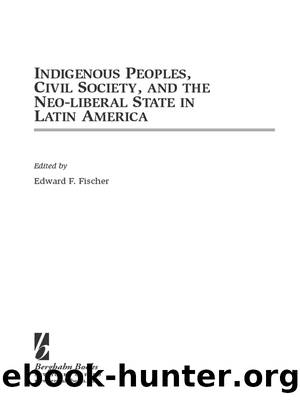Indigenous Peoples, Civil Society, and the Neo-liberal State in Latin America by Edward F. Fischer

Author:Edward F. Fischer [Fischer, Edward F.]
Language: eng
Format: epub
ISBN: 9781845455972
Barnesnoble:
Publisher: Berghahn Books, Incorporated
Published: 2008-10-01T00:00:00+00:00
Conclusion: The Power of Community
Involved for two decades in activism at the national level, Ecuadorian indigenous communities have endured as icons of their country's indigenous culture and as core elements of its politics. When a politician says âin the communities,â it is the same as saying âamong indigenous people.â These communities, however, are not merely peasant communities newly awakened with an indigenous consciousness (pace Guerrero Cazar and Ospina Peralta 2003). Encompassing the stressed resources and multi-threaded careers of the postâland reform generation, they span long distances and grow in knowledge and social networks, yet they are declining in shared work routines. Indeed, their political ascendance has come at a moment of great cultural dissonance.
In my analysis of indigenous politics, the goal of putting communities first has meant losing sight of the coordination offered by national organizations such as CONAIE. This leadership has been essential for the movement, but the politics of the national movement and the political power of the indigenous base are distinct. If they were mutually reinforcing in the 1980s, the missteps of the early 2000s have shown how the national groupsâ fortunes can strengthen or fall independently of the communities. A clearer understanding of indigenous civil society is not merely an effort to understand how communities serve as a base of CONAIE, but also how communities can become organized to operate in parallel or even at odds with the national movement.
An emphasis on community also displaces the importance of identity. Certainly for those who participate in community politics, just as for those who rally around CONAIE, identity is a central concern. Motivated by their sense of identity, many community members become activists to rediscover the value of indigenous history and celebrate ancient commitments to land and family. Just as assuredly, others who are equally inspired by their indigenousness become activists to break with the past and finally modernize their communities. That is, rather than offering bedrock values to unify people, identity claims can bring people into conflict.
Warren and Jackson (2002: 12) describe the political problem posed by such internal difference in terms of representation, pointing out that the politics of indigenous self-representation is double-sided. It entails both âwho represents whomâ and âwhich social lives, languages and knowledge should be represented to selves and to others.â But why stop at representation? Members of indigenous communities must work out problems beyond discourse, identity, and communication. They pursue conflicting interests, make and unmake relationships, and reproduce shared bases of economic life. The project of self-representation offers one means to work through these issues. However, the importance of indigenous community practice is that it offers other mechanisms to coordinate effort and sustain shared projects.
Peasant comunas, commercial associations, cooperatives, and other collectivities have maintained the power of communities locally and escalated their authority nationally through what I conceive as vernacular statecraft. Scott (1998) has argued that state power operates along a set of axes marked as legible/interchangeable/durable. Community power, in contrast, is often contextual/particular/ephemeralâstrong on the practical knowledge that Scott refers to as metis.
Download
This site does not store any files on its server. We only index and link to content provided by other sites. Please contact the content providers to delete copyright contents if any and email us, we'll remove relevant links or contents immediately.
| Antitrust | Civil Law |
| Emigration & Immigration | Federal Jurisdiction |
| Housing & Urban Development | Indigenous Peoples |
| Land Use | Public |
| Public Contract | Public Utilities |
| Urban, State & Local Government |
Killers of the Flower Moon by David Grann(3272)
Machine Learning at Scale with H2O by Gregory Keys | David Whiting(2338)
Will by Will Smith(2087)
Guns, Germs and Steel by Diamond Jared(1896)
Borders by unknow(1795)
The Room Where It Happened by John Bolton;(1726)
The Color of Law by Richard Rothstein(1581)
Once Upon a Broken Heart by Stephanie Garber(1536)
Water Rights and the Environment in the United States by John Burch(1418)
Friends, Lovers, and the Big Terrible Thing by Matthew Perry(1360)
Examples & Explanations: Administrative Law by William F. Funk & Richard H. Seamon(1336)
A Short History of War by Jeremy Black(1314)
The Strength In Our Scars by Bianca Sparacino(1299)
HBR's 10 Must Reads 2022 by Harvard Business Review(1268)
Pharmacy Practice and The Law by Richard Abood(1260)
That Every Man Be Armed by Stephen P. Halbrook(1246)
The Guarded Gate by Daniel Okrent(1229)
515945210 by Unknown(1221)
Injustices by Ian Millhiser(1206)
